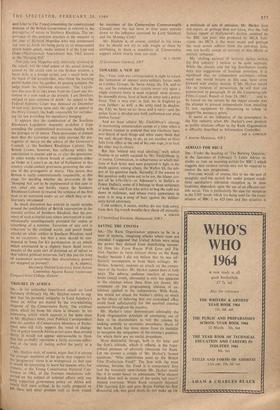TROUBLE IN AFRICA
SIR,—In his somewhat impertinent attack on Lord Salisbury (February 14), .114r. Hayhoe seems to sug- gest that his personal antipathy to Lord Salisbury's views on Africa are shared by the overwhelming majority of the Conservative Party. The evidence upon which he bases his claim is obscure. In his interesting article which appears in the same issue as Mr. Hayhoe's letter, your Political Correspondent Puts the number of Conservative Members of Parlia- ment who still fully support the 'wind of change' line of policy towards Africa at not more than around thirty. It would not appear unreasonable to think that this probably represents a fairly accurate.reflec- boa of the state of feeling within the party as a whole.
Mr. Hayhoe may, of course, argue that it is among the younger members of the party that support for
his 'progressive' views is so widespread. In that case !,t would be interesting to learn his reasons why, for instance, at the Young Conservative National Con- ference in 1962, of the fourteen resolutions sub- mitted on the subject of colonial affairs only one hail, supported government policy on Africa and nearly half were critical. Is he really prepared to put these and other protests such as those voiced
by members of the Conservative Commonwealth Council over the last three or four years entirely down to the influence exercised by Lord Salisbury and the Monday Club?
Mr. Hayhoe is, of course, entitled to his views but he should not try to add weight to them by attributing to them a unanimity of Conservative support which clearly does not exist.
30 Ennismore Gardens, SW7 G. I. GREIG


































 Previous page
Previous page